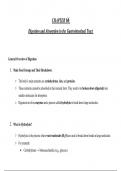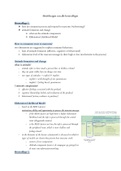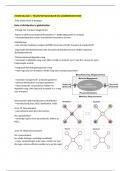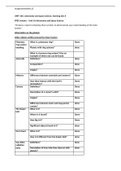Lecture 1: Introduction
Embedded liberalism
Embedded liberalism= Post WWII economic and political arrangement that combined the principles of a liberal
market economy with a commitment to social welfare and state intervention
- Markets & Capitalism Embedded in larger international system that regulated the market economy
- Made that states could have more control over domestic economy
- Acknowledged the benefits of a global economy but embedded these within a framework that prioritized national
policies to protect citizens from the volatility of unfettered markets
Post war compromise
Post War compromise= Agreement between the left and the right over the social and political arrangement
- Right Market economy (capitalism)
- Left Social protections (rights)
- Implicit agreement
This was possible due to the embedded liberalism
Welfare State
Welfare state= Social system in which the government assumes a primary role in ensuring the economic and social
well-being of its citizens
- Provides social services
Happened after the 1920’s, where the state didn’t interfere enough
Globalization
Economic integration= Reduction in trade barriers
Globalization has facilitated the spread of cultural ideas, media and lifestyles, resulting in increased cultural diversity
and exchange
Technological advancements have accelerated the speed of globalization
Lecture 2: Political parties and Party models
Definitions political party
,1. Political party= An institution that seeks to influence a state, often by attempting to occupy positions in
government, and usually consists of more than a single interest in the society and so to some degree attempts to
aggregate interests
- But, it doesn’t include one-issue parties
- But, it doesn’t specify the need for a democracy
2. Political party= Any political group identified by an official label that presents at elections, and is capable of
placing through elections (free/non-free), candidates for public office
3. Political party= An autonomous group of citizens whose purpose is to making nominations and contests elections
in the hope of gaining control of government power by capturing of public offices and the organsation of
government
- But, there is too much focus on government
Thus, parties are/have
- Organizing role
- Linkage= they are the link between parliament, government, policy and citizens
o Differs per party
Democracy without parties
Parties are inevitable There has never been a representative government without them
- Parties bring order out of chaos to a multitude of voters
- There is no representation without parties
Political parties and democracy
Robert Dahl
True democracy direct representation
- Ideal is the Greek Polis
Due to rise of the nation state, representation is only possible via a representative democracy
Polyarchy= the existing democracy
- Is about representative democracy
Nadia Urbinati
Party democracy mediation
- Between citizens & representation
- Contestation (discussion) between parties over ideas
Parties organize pluralism
- They mobilize the people
Anthony Downs
Social and political issues are complex
- Political parties reduce information to digestible pieces ideology
o They create order they create a story that is understandable
Citizens don’t have time nor knowledge to be fully informed
David Van Reybrouck
Not per se against parties, but he is critical of elections
- Answer sortition
o Sortition= lottery system where citizens are randomly called into office outside/above the parties
- Representation is about more than parties
o Democracy is thus possible without parties
People can use common sense vision of how to solve problems
Citizens & Parties
Party means a part of whole create division/faction of a whole
, - Has a negative sense
People don’t like or trust them
Parties were there to control fractions
Democracy with parties
Katz & Mair
Democracy is not possible without parties
The type of party model influences the type of democracy
- Not about more or less parties
Parties organize certain cleavages
- Type of party & relation to system
The type of party influences the type of linkage
Parties should not only be understood on the basis of their relationship with civil society
- This sets the mass-party model as the standard against which everything should be judged
- This undervalues the extent to which differences between parties may also be understood by reference to their
relation with the state
Developments of parties is a dialectical process in which each new party type generates a reaction that stimulates
further development to a new party
- It comes from changes in civil society & changes in the relations between parties and the state
Mass-party model
Politics primarily about the competition, conflict and cooperation of social groups
- Political parties are the agencies through which these groups participate in politics, make demands to the state and
ultimately attempt to capture control of the state by placing their own representatives in key offices
- Political parties provide the essential linkage between citizens and state
Individual electoral choice constrained by the division of the mass into one of the subcultural groups that the
parties represent
System was challenged by the Catch-all party in three ways:
1. Erosion of traditional social boundaries weakening of formerly highly distinctive collective identities
2. Economic growth and the increased importance of the welfare state facilitated the elaboration of programmes
that were no longer so necessarily divisive nor partisan, but could be claimed as to serve interests of all
3. Development of mass media Party leaders began to enjoy a capacity to appeal to the electorate at large
Catch-all party model
Elections revolve around the choice of leaders rather than the choice of policies or programmes
Electoral behaviour not longer moulded by predispositions but based on choice
- ‘zwevende kiezer’
Parties continued to be evaluated primarily in terms of linkage between party and civil society, but this linkage was
undermined
Important implications
1. The position of parties as brokers between civil society and the state suggests that the parties themselves may have
interests that are distinct from those of their clients on either side of the relationship
2. Capacity of party to perform the brokerage function doesn’t only depend on its ability to appeal to the electorate,
but also on its ability to manipulate the state
Type of parties
These parties show the process of four separate stages that shows the evolutionary process of party, state & civil
society)
The Cadre Party
Stage 1: Liberal régime cesitaire
- Restrictive suffrage requirements and other limitations on the political activity of the propertyless
- Conceptual distinction between civil society and state was valid, but less in practical terms











